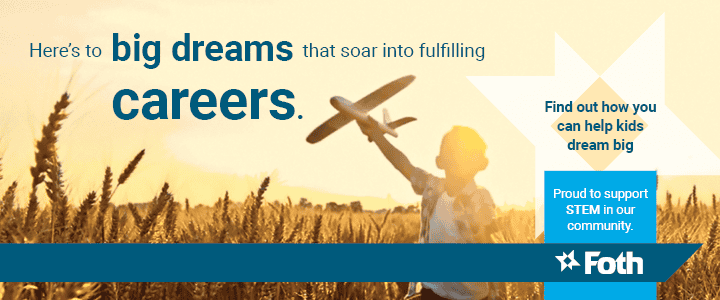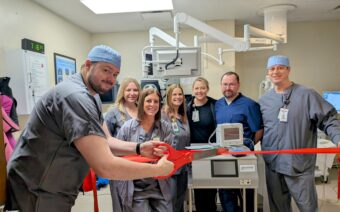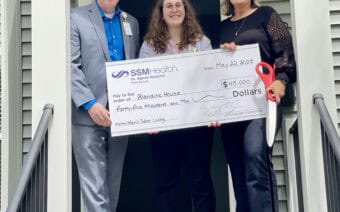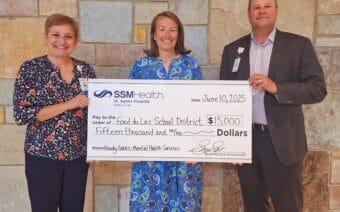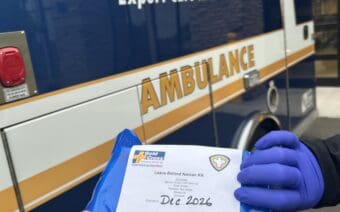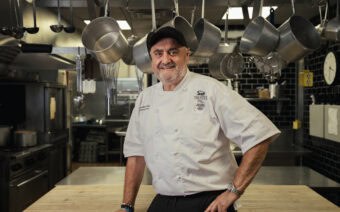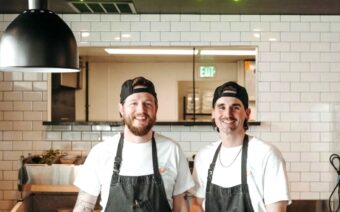
March 20, 2024
APPLETON — It’s often said that teamwork makes the dream work.
Amy Van Donsel, manager of rehab services at Children’s Wisconsin Appleton Clinic, said that rightfully describes the partnership Children’s Wisconsin has with Fox Valley Technical College (FVTC).
Over the last year, the two entities have worked together to successfully implement the Go Baby Go! program in Northeast Wisconsin.
Go Baby Go! is part of a nationwide program that helps children with special needs gain independence through having their own customized vehicle.
“The program was founded by Dr. Cole Galloway at the University of Delaware, and the idea behind it was, how do we get these kids some self-initiated mobility?” Katelin Keck, physical therapist at Children’s Wisconsin Appleton Clinic, said. “Because many of them have not been able to move on their own independently.”
Van Donsel said the program’s success at the Children’s Milwaukee location prompted the desire to bring the program “closer to home.”
“We wanted to mimic our Go Baby Go! program in the southeast region — they have a partnership with Marquette University,” she said. “So, we started the process of trying to find a partner probably a couple of years ago. Partnering with an educational institution has served the program well.”
Vehicles, Van Donsel said, are provided to families at no cost to them, thanks in part to a variety of benefactors.
A win-win-win
The partnership between FVTC and Children’s Wisconsin, Van Donsel said, is a win-win-win situation.
She said not only are the children receiving often life-changing, customized vehicles, but students in a variety of programs at the college are getting hands-on, out-of-the-box experience as well.
“(There is an) opportunity for students in the occupational therapy assistant program to utilize those students as volunteers (in the program),” she said. “Then within the electromechanical engineering and robotics department (through the electronics club), they have an opportunity to use their students to modify the vehicles. It’s worked wonderfully with all of the skilled individuals who are involved — and passionate individuals, too, I would say.”
Keck said when looking for an educational partner, “we wanted to work with somebody that could help us with our mission of getting these cars to kids,” as well as get students involved.
“We can’t build these cars without the tech,” she said. “We can tell them how to make them and what we need, but we need the engineers to help us along the way. They’ve truly been wonderful and phenomenal partners, and we only hope to continue to grow the program with them.”
Aaron Daane, an electromechanical technology instructor at FVTC, said the partnership allows students to put some of their learned skills to use, while at the same time giving back to the community.
“So far, they’ve gotten some good enjoyment (out of the program),” he said. “And they see the reward of it when they see the kid getting to drive the car — doing something they’ve never been able to do before.”
FVTC’s participation in the Go Baby Go! program, Daane said, also allows him to give back through his skills.
“I’m able to help my students learn something that’s maybe not something they would be doing in a factory or a similar position, but it does give back to the community,” he said.
The increasing need and demand for engineers in the biomedical field, Daane said, even further highlights the importance of FVTC’s partnership with Children’s Wisconsin.
“There’s a need to have some engineering capabilities for some of these things,” he said.
Daane said his role is to order all of the parts needed for each car, as well as guide the electronic club students through the customization process.
“I will make sure they are doing each of the cars to the specifications each child needs,” he said. “Usually, it’s just providing them with the schematics they need, getting the parts they need and then letting them do the work — and then being there if they have questions.”
The cars, Daane said, are the typical life-like ride-on vehicles you can buy in stores or online — which are then modified for the schematics needed for each child depending on need.

Miriah Seyler said the car her son Callen received through the Go Baby Go! program allows him to do things he normally can’t because of his mobility struggles. Photo Courtesy of FVTC
“That could mean maybe a push button on the steering wheel to make it go instead of a foot pedal,” he said. “Other modifications could be a five-point harness, extra padding, a head restraint or other customizations.”
Daane said he is typically there for car deliveries as well, “just to make sure everything works and the specifications are correct.”
Since starting the Go Baby Go! Program through FVTC last May, Daane said the team has fitted 27 Northeast Wisconsin children for customized cars.
“We distributed our 25th car March 8,” Keck said. “We typically size about three to four cars a month.”
Keck said providing an opportunity for children with mobility challenges to access their environment independently is priceless.
“Giving these children cars allows them to push a button and go without mom or dad or sibling moving them around,” she said. “Now they can go on walks with their family, and they can participate in their environment actively.”
Keck said it also grows their cognition, as well as other gross motor and speech skills because they are interacting with their environment differently.
“Maybe they’ve only been laying down or sitting up, and now they can be upright and engaged with their world,” she said.
Closer to home
Before bringing the Go Baby Go! program to Northeast Wisconsin, Keck said families would be required to drive to Milwaukee for fittings and car pick-up.
“The fitting appointments last maybe 15 to 30 minutes, and the pick-up is sometimes even less,” she said. “We had families driving two, two-and-a-half hours for these small appointments and then driving two, two-and-a-half hours back home. We’re looking for applicants if people want to apply.”
Launching a second program in the Fox Valley, Keck said, provides that ease for parents with fittings and pick-up.
“(We wanted) to essentially establish programs in both of the communities we serve,” she said.
The process
Keck said the Fox Valley-based program is open to anyone in the region and beyond.
“We’re open to anybody in our community, or farther away if they want to come this way,” she said.
The first step, Keck said, is filling out a Go Baby Go! application at childrenswi.org.
Applications, she said, are submitted through either the Fox Valley or Milwaukee branch.
“We review those applications and then can process those and get them scheduled for a fitting,” she said. “We fit cars for ages of about nine to 10 months up to about four and a half to five years old, depending on the size of the child.”
Making an impact
Keck said being involved in the Go Baby Go! program has not only been rewarding professionally, but personally as well.
“It’s a passion project of mine to see the kids smile and hear them laugh — the happiness — when they get in their cars for the first time,” she said. “We get to reach out to the Greater Fox Valley, Green Bay and De Pere community.”
Van Donsel said as it’s often said, “the proof is in the pudding” regarding the partnership between Children’s Wisconsin and FVTC.
“We have come together, and we’re utilizing our strengths in each area to make this work,” she said.
For the program to work smoothly, Van Donsel said each partner needs each other.
“Children’s Wisconsin couldn’t do this without FVTC — it is instrumental in having that electrical/engineering knowledge to be able to modify the vehicles,” she said. “And then FVTC couldn’t do this without us because we provide the skills and the know-how to properly fit these kids with special needs into the vehicle. Bringing those individual strengths to the table allows us to provide the best outcome.”
Michael Alvarez Gonzalez, a student in the automated manufacturing systems technology program, who helps assemble and modify the vehicles for families, said “it’s hard to put into words when you see the child get their new vehicle.”
“It’s kind of like setting fire to a candle for the very first time — it is very enlightening to see,” he said.
Three-year-old Callen received his second car through the Go Baby Go! program — an upgrade to his original vehicle he received in Milwaukee when he was younger — earlier this month.
His mom, Miriah Seyler, said Callen, who has Down Syndrome, said so much of what her son experiences in a day is medical, “it is a lot of appointments and therapy, so to have this be something that is completely fun — it is just so heartwarming.”
“His muscle tone doesn’t allow him to do things that typical three year olds would because of Down Syndrome,” she said. “This car allows for those types of things. It’s just amazing.”
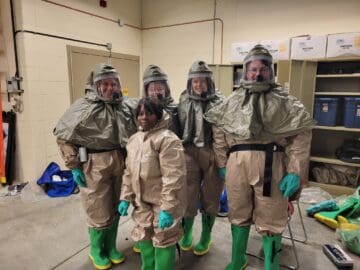 Built on safety, powered by people
Built on safety, powered by people Green Bay Public Market expected to fall short of 2025 NFL Draft deadline
Green Bay Public Market expected to fall short of 2025 NFL Draft deadline

